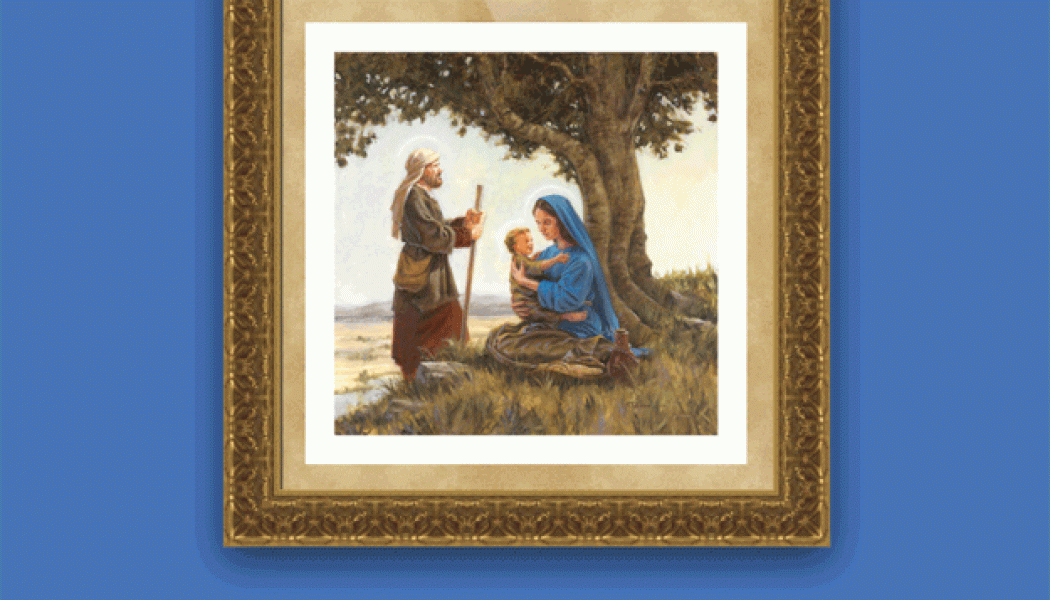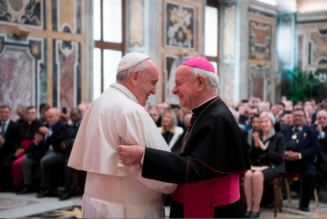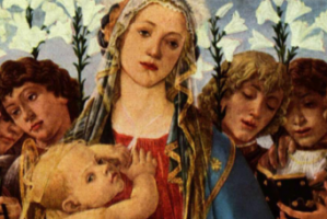By Dr. Jeff Mirus ( bio – articles – email ) | Apr 23, 2021
I suppose we have all awakened on a spiritually foggy morning and wondered what’s the use. Compared to the better olden days, during which Christ appeared to have triumphed throughout the West and the Church made a good stab at evangelizing the world, we seem so utterly fruitless. Every day now, for a full lifetime and more, each step appears to be a step backwards, and each triumph a grace of suffering only. Sometimes it seems that, one after another, each new hope has left Him and fled. Writers like to remind us that it is always darkest before the dawn, but do we have any reason to expect the dawn?
If this seems hopeless, I want to emphasize that it represents our foggiest of moods. Even in the worst of times, the engraced human heart admits a difference between human expectation and Christian hope. Faith for us—as for the writers of the New Testament—is at once belief in Christ’s teachings, obedience to His commands, and trust in His promises. So we need to recognize that these darker thoughts arise less from lack of faith than from human fatigue. Humanly speaking, after all, it is our lot to live through an extended and exhausting experience of a collective Catholic failure to reverse the wholesale desertion of Christ by our mainstream culture.
But the reality of being a Christian remains, and we must still recognize the fundamental change described by St. Paul: “It is no longer I who live, but Christ who lives in me; and the life I now live in the flesh I live by faith in the Son of God, who loved me and gave himself for me” (Gal 2:20). It should not be surprising, then, that Paul introduces this statement of his faith with a preliminary declaration: “I have been crucified with Christ.” Moreover, Our Lord Himself knew this desolation. He sweat blood. He begged His Father to withdraw the cup of sorrow. In the midst of His crucifixion, He cried out: “My God, my God, why have you forsaken me?” (Mt 27:46; Mk 15:34)
We must also remember that the first time this ultimate lament appears in Scripture, it is the cry of the Psalmist (Ps 22:1) who, while he did not suffer darkness as Christ suffered it, nonetheless endured a fog deeper than our own, and with far less reason for hope.
Counterpoints
How to respond? The first counterpoint is to recall that in this suffering of what appears to us to be constant Christian failure we are sharing in the sufferings of Christ. We must remind ourselves daily that no servant is greater than His master, nor any messenger greater than the one who sent him (Jn 13:16). Our Lord Himself explained: “If they persecuted me, they will persecute you” (Jn 15:20), and indeed the first and finest persecution is to neutralize one’s enemies, to render them irrelevant, to not even give them the satisfaction of being martyrs.
Surely this is our special suffering today: In effect, to be “canceled”, even far too often in our own families. Yes, this is very hard. Yes, this can and does trigger frustration and that sense of overpowering futility I am discussing here. And yet this will always be the special suffering of the Christian, and I think it is important to notice that it is primarily through a misreading of our own history that we fall into the trap of thinking it is something new, of believing this is a new cross only in our own time. In fact, I would argue that, despite cultural shifts, a minority status beset by apparent futility is normal for the serious Christian.
To understand this, we need to explore the other side of history. We can pick any period of the Church’s history and we will find, along with any obvious successes, the following three characteristics: The Church ran into trouble with worldly power wherever she was true to her mission; serious Christians experienced frustration far more often than not; and wherever the Church appeared to be culturally dominant, or tried to cling to cultural dominance, she was in grave need of reform. About the only thing we can state with a certain unfortunate bitterness now is that the Church and Christianity, despite many setbacks, seemed at one time to be generally on an upswing within the Western culture of which most of us are heirs. But even so, that was a very imperfect and fidgety upswing, now well over 500 years in the past.
In any case, it would seem that those who actually take Christianity very seriously have always had a decidedly minority status. When we combine our observation of this sad reality with the warnings of Jesus Christ, we would not be wrong to suppose that this is to be regarded as the norm. Not only did Our Lord warn against loving “the place of honor at feasts and the best seats” (Mt 23:6), but he stressed the very opposite: “Blessed are you when men revile you and persecute you and utter all kinds of evil against you falsely on my account” (Mt 5:11). Where then do we come by this assumption that things are supposed to be different?
A little more history
I could go through each period of even Western history and illustrate this thesis. Surely, for example, in the first centuries of Christian history, the faithful suffered disproportionately (as we might say) for their gains, a problem that may seem very romantic to us now—but perhaps was not so romantic in real life. In the centuries after the fall of Rome, authentic faith and practice shared cultural space with every kind of pagan falsehood, even after government became, in some sense, officially Christian. Even later, during the “age of Christendom”, there were constant quarrels between popes and kings, frequent upheavals in the universities, a remarkable ebbing and flowing of the spiritual health of religious communities, widespread theological and spiritual ignorance, and repeated calls for reform and renewal.
In fact, it is hard to find a saint from the good old days who was not appalled by the intense worldliness of even the most Catholic rulers, the nobility, the common people, and of course the popes, bishops, priests, and monks—in short, by the frustrating worldliness of a culturally influential Catholic Church. Accordingly, we might draw a lesson from history: Wherever the Church is in some way culturally dominant, or no longer dominant but still wealthy, her leaders are in a similar degree worldly and corrupt. Her influence is constantly manipulated for worldly purposes, both within and without.
Surely she was involved in every political struggle between, say, 1100 and 1600, often with decidedly worldly motives. Bishops, who were generally drawn from the younger sons of the nobility, were typically known more for their worldly interests than for their piety. Education of the general clergy was most often a standing joke. Take almost any saint, even from the golden olden days, and you will find immense obstacles in his or her path. Thus even in the age of Christendom, St. Francis had to renounce his inheritance, while St. Thomas Aquinas’ family tempted him to abandon his vocation by introducing a prostitute into his room.
As she entered the early modern period, of course, the Church’s socio-political influence was already rapidly vanishing away. There was still a great deal of wealth and power in the Church in various regions (but then there is immense wealth in the Church in Germany today, too). But more often than not, devout souls called to engage in new apostolates met with initial opposition from their own superiors. In the early eighteenth century, St. Louis de Montfort’s work was frequently undermined by the powerful Jansenist party in the French Church, and when St. Alphonsus de Liguori tried to found the Congregation of the Most Holy Redeemer, he was opposed by the head of the Propaganda Fidei (forerunner of the Congregation for the Doctrine of the Faith). Moreover, even his first followers rebelled against his leadership, forcing him to start over.
Of the steady decline of the influence of both the Faith and the Church throughout the modern period, no mention need be made. The point here is to illustrate, in very broad strokes, that in every single period of her history, the Church has found that “it was the best of times; it was the worst of times”, as Dickens wrote so pointedly of the period of the French Revolution. It was the worst of times to stand pat, and the best of times to initiate reform; and it is still the best and worst of times even now: Best because we live and move and have our being in Jesus Christ; worst because so few care a fig for this stupendous miracle.
Focused on Christ
My point is that we must rid ourselves of the illusion that Christ and the Church have ever been triumphant in this world. Late in the so-called age of Christendom, St. Thomas More gives us a perfect example: He reached the heights of his fame and influence in the court of King Henry VIII of England, who had received the title of “Defender of the Faith” from Rome. But within twenty years Henry had dissolved the monasteries, hijacked the Church in England, and martyred St. Thomas among many others. Priests were driven underground, on pain of death; Catholic laity lost their wealth and standing.
I hope, in fact, that there has never been a good Catholic who thought the world was, at long last, going well. My point is that, in this vale of tears, the fog is perpetual—so perpetual, in fact, that we see now only as through a glass darkly. That is why Our Lord ended his time with his disciples by explaining that He would send them the Holy Spirit, and then doing exactly that. During his last discourse to them, he also explained that he had forewarned them for a reason:
I have said all this to you to keep you from falling away…. I have said this to you, that in me you may have peace. In the world you have tribulation; but be of good cheer, I have overcome the world. [Jn 16:1,33]
He also promised that “he who endures to the end will be saved” (Mt 10:22, 24:13; Mk 13:13). And yet He did raise a startling question: “Nevertheless, when the Son of man comes, will he find faith on earth?” (Lk 18:8).
It is important to recognize that what Christian faith boils down to in the end is an unshakable confidence that Jesus Christ will make the last first:
“Friend, I am doing you no wrong; did you not agree with me for a denarius? Take what belongs to you, and go; I choose to give to this last as I give to you. Am I not allowed to do what I choose with what belongs to me? Or do you begrudge my generosity?” So the last will be first, and the first last. [Mt 20:13-16]
This is the great, overarching hope and conviction of all who even now live in and for the Kingdom of God. This is our hope for ourselves, who take a lifetime to turn away completely from our sins. And it must also be our hope for countless others who, in part because we have joined our sufferings to Christ’s, will be brought home to Him at the last moment, perhaps even at the point of death—through the very thing that was hardest for them to achieve, which is simply a cry for mercy.
So, yes, this really is hard, and it is especially hard within families:
Do you think that I have come to give peace on earth? No, I tell you, but rather division; for henceforth in one house there will be five divided, three against two and two against three; they will be divided, father against son and son against father, mother against daughter and daughter against her mother, mother-in-law against her daughter-in-law and daughter-in-law against her mother-in-law. [Lk 12:51-53]
But our job is not to appear to be successful, and it never has been. Our job is to be faithful, and to leave the rest to Him. Absolute confidence in Christ often seems beyond us, but repeated acts of confidence are not, especially in the midst of suffering. This is what it means to have Christian hope. And this is why the early morning fog can and must be dispersed, whenever it appears, by a simple act of faith.
For though His kingdom is not of this world, Our Lord enjoins one final duty upon us even here and now, in this very foggy world of remembered loss and blinding tears. It is a matter of continually deciding to choose the better part, of focusing on Christ alone, and of reaffirming in our hearts exactly what He tells us—reaffirming it once, and again, and yet again:
“Be of good cheer. I have overcome the world.”
Sound Off! CatholicCulture.org supporters weigh in.
All comments are moderated. To lighten our editing burden, only current donors are allowed to Sound Off. If you are a current donor, log in to see the comment form; otherwise please support our work, and Sound Off!

There are no comments yet for this item.
Join Our Telegram Group : Salvation & Prosperity











